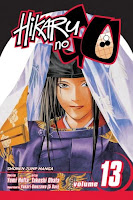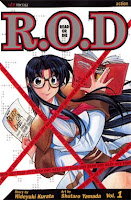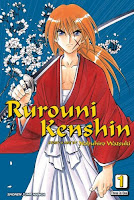My News and Reviews
I had a taiko performance this past weekend which meant I was kept pretty busy all week with extra rehearsals. I didn’t get a chance to watch anything since I wasn’t at home much, but thankfully manga is fairly portable. Experiments in Manga had the usual set of end/beginning of the month posts during the week. I announced the Give It Your All Giveaway Winner. The post also includes a list of manga licensed in English that feature mangaka as characters. The bookshelf overload for April was also posted. And, just to mix things up a little bit, the latest Library Love has been posted. I also updated the Resources page to include two new blogs: Sequential Ink, which I thought I had already added long ago, and Matt Talks About Manga, which one of my manga buddies just recently started.
I’d like this opportunity to congratulate Shameful Otaku Secret!, the blog matched with Experiments in Manga in the second round of the Aniblog Tourney, for advancing to the third round! Overall, the tournament was less traumatic than I thought it was going to be. I received some constructive criticism, some not so constructive criticism, a few compliments, and even gained a couple of new readers. Some people loved Experiments in Manga while others absolutely hated it. Probably even more people didn’t really care much either way. And I’m perfectly okay with that.
Probably the biggest bit of manga news from last week is that Right Stuf has teamed up with Tokyopop to publish the third volume of Hetalia for the first time ever in English. They are also offering the first two volumes as part of their newly established print on demand service. If Hetalia does well, they hope to expand the service to include other out of print manga as well. This is very exciting news for manga publishing and I hope they are successful. Right Stuf posted a YouTube video explaining the project and shows off the final product. Brigid Alverson also has a great interview with Right Stuf’s director of marketing and communications about the project over at MTV Geek—Hetalia Manga Rescue: What Happened, and What Might Happen Next.
Quick Takes
 Hikaru no Go, Volumes 13-16 written by Yumi Hotta and illustrated by Takeshi Obata. Even though the stress and drama surrounding the pro test is over, Hotta is still able to find interesting ways to keep the series steadily moving forward as Hikaru begins his new career. The foreshadowing is a little heavy handed, but that doesn’t make Sai’s fate any less heartbreaking once it finally comes to pass. I was very happy to see Isumi return as a character. Isumi is important to Hikaru’s story and development, but the series also lets him take the lead briefly while exploring the world of Chinese Go—introducing some fantastic secondary characters in the process. I hope we’ll see them return as well.
Hikaru no Go, Volumes 13-16 written by Yumi Hotta and illustrated by Takeshi Obata. Even though the stress and drama surrounding the pro test is over, Hotta is still able to find interesting ways to keep the series steadily moving forward as Hikaru begins his new career. The foreshadowing is a little heavy handed, but that doesn’t make Sai’s fate any less heartbreaking once it finally comes to pass. I was very happy to see Isumi return as a character. Isumi is important to Hikaru’s story and development, but the series also lets him take the lead briefly while exploring the world of Chinese Go—introducing some fantastic secondary characters in the process. I hope we’ll see them return as well.
 R.O.D: Read or Die, Volumes 1-4 written by Hideyuki Kurata and illustrated by Shutaro Yamada. Read or Die started as a light novel series, but the manga is also written by the same author. I love the conceit of the Read or Die universe so much that I like the manga more than I probably should. Papermasters are bibliophiles who love books and are loved by books in return to such an extent that they have gained supernatural control over paper itself. Yomiko Readman, also known as “The Paper,” is an agent of the ominous British Library and is an extremely talented papermaster. It’s a pity that the manga doesn’t quite live up to its premise, with a plot that is all over the place and occasionally incoherent. The first volume could almost belong to an entirely different story.
R.O.D: Read or Die, Volumes 1-4 written by Hideyuki Kurata and illustrated by Shutaro Yamada. Read or Die started as a light novel series, but the manga is also written by the same author. I love the conceit of the Read or Die universe so much that I like the manga more than I probably should. Papermasters are bibliophiles who love books and are loved by books in return to such an extent that they have gained supernatural control over paper itself. Yomiko Readman, also known as “The Paper,” is an agent of the ominous British Library and is an extremely talented papermaster. It’s a pity that the manga doesn’t quite live up to its premise, with a plot that is all over the place and occasionally incoherent. The first volume could almost belong to an entirely different story.
 Reversible, Volume 1 by Various. I had high hopes for what was supposed to be the first volume of the Reversible boys’ love anthology series. Unfortunately, I was disappointed. The title of the anthology is somewhat misleading—so far, there are no reversible couples to be found (which makes me very sad). Perhaps the name is supposed to reflect the a variety of stories? Except, there really isn’t much variety contained. Reversible collects eleven stories, many of which are the creators’ debuts in English. The selections are either short, standalone manga or the beginning of a longer story. None of them were particularly noteworthy. As far as I know, there are no immediate plans for the release of a second volume.
Reversible, Volume 1 by Various. I had high hopes for what was supposed to be the first volume of the Reversible boys’ love anthology series. Unfortunately, I was disappointed. The title of the anthology is somewhat misleading—so far, there are no reversible couples to be found (which makes me very sad). Perhaps the name is supposed to reflect the a variety of stories? Except, there really isn’t much variety contained. Reversible collects eleven stories, many of which are the creators’ debuts in English. The selections are either short, standalone manga or the beginning of a longer story. None of them were particularly noteworthy. As far as I know, there are no immediate plans for the release of a second volume.
 Rurouni Kenshin, Omnibus 1 (equivalent to Volumes 1-3) by Nobuhiro Watsuki. Rurouni Kenshin is such a popular and successful manga that new adaptations are still being made of it. Kenshin is a wandering swordsman during the Meiji era. Although he once worked as an assassin during the final days of the Tokugawa shogunate, he wants nothing more than to live peacefully and atone for the lives he has taken. I really like Kenshin as a character. He’s easily my favorite part of the series up to this point. Although I’m not particularly riveted by the manga as a whole yet, I do appreciate the story’s historical basis and inspiration. Some of Kenshin’s more outrageous opponents seem a bit odd and out of place considering the more realistic aspects of the manga, but I am liking the series.
Rurouni Kenshin, Omnibus 1 (equivalent to Volumes 1-3) by Nobuhiro Watsuki. Rurouni Kenshin is such a popular and successful manga that new adaptations are still being made of it. Kenshin is a wandering swordsman during the Meiji era. Although he once worked as an assassin during the final days of the Tokugawa shogunate, he wants nothing more than to live peacefully and atone for the lives he has taken. I really like Kenshin as a character. He’s easily my favorite part of the series up to this point. Although I’m not particularly riveted by the manga as a whole yet, I do appreciate the story’s historical basis and inspiration. Some of Kenshin’s more outrageous opponents seem a bit odd and out of place considering the more realistic aspects of the manga, but I am liking the series.
